From MindaNews (Oct 12, 2020): Mid-term review recommends extension of Bangsamoro transition until June 2025 (By CAROLYN O. ARGUILLAS)
DAVAO CITY (MindaNews / 12 October) – A mid-term review of the three-year transition in the Bangsamoro Autonomous Region in Muslim Mindanao (BARMM) listed accomplishments, ongoing programs and legislation and what have yet to be done, and, citing results of focus group discussions, recommended an extension of the transition period until June 2025 to allow the Bangsamoro Transition Authority (BTA) and the national government “sufficient time to fully accomplish their priority tasks and duties especially those that need to be jointly implemented”The BARMM is the third autonomous region set-up in the predominantly Moro areas in the past four decades but the first to adopt a parliamentary system within a highly-centralized Presidential system of government.
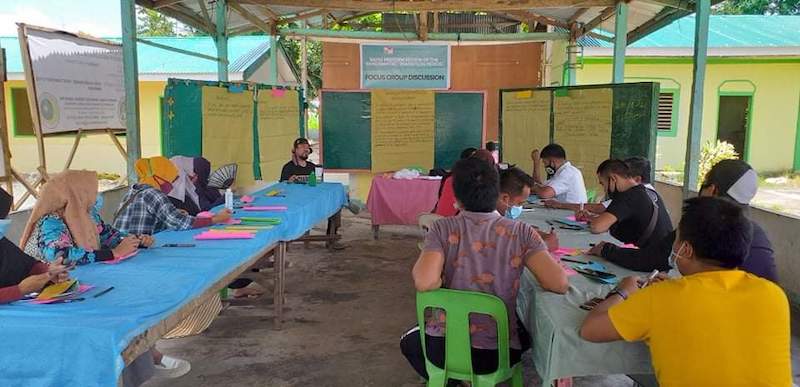
One of the focus group discussions conducted during the mid-term review of the Bangsamoro transition. Photo courtesy of MPC
Lawyer Mary Ann Arnado, Secretary-General of the Mindanao Peoples’ Caucus (MPC), a peace advocacy group that conducted the mid-term review, told MindaNews on Sunday that the call to extend the transition period came not only from the FGDs “across sectors and political persuasions” but also from the Sangguniang Panlalawigan of Maguindanao and the Governor and the League of Municipalities of the Philippines’ (LMP) chapter in Tawi-tawi.
The Maguindanao SP on October 15, 2019 passed Resolution 2019-349 urging Congress to “enact a law providing for sufficient transition period for the (BTA) to accomplish and complete the purpose for which it was created” by amending the date of the first election of the Bangsamoro Parliament from May 9, 2022, to May 12, 2025. The LMP-Tawi-tawi passed a similar resolution on July 2, 2020.
Covering the period from January 25, 2019 – the ratification of Republic Act 11054 or the Organic Law for the BARMM – to September 30, 2020, the mid-term review pored over documents and conducted key informant interviews and 21 focus group discussions involving 232 participants in the BARMM provinces of Maguindanao, Lanao del Sur, Basilan, Sulu, Tawi-tawi including the cities of Marawi and Lamitan, and Cotabato City and from the 63 villages in North Cotabato.
The BARMM is a product of the Comprehensive Agreement on the Bangsamoro (CAB), the peace agreement signed by government and the Moro Islamic Liberation Front (MILF) in March 2014, with RA 11054 as its enabling act.
Lawyer Mary Ann Arnado, Secretary-General of the Mindanao Peoples’ Caucus (MPC), a peace advocacy group that conducted the mid-term review, told MindaNews on Sunday that the call to extend the transition period came not only from the FGDs “across sectors and political persuasions” but also from the Sangguniang Panlalawigan of Maguindanao and the Governor and the League of Municipalities of the Philippines’ (LMP) chapter in Tawi-tawi.
The Maguindanao SP on October 15, 2019 passed Resolution 2019-349 urging Congress to “enact a law providing for sufficient transition period for the (BTA) to accomplish and complete the purpose for which it was created” by amending the date of the first election of the Bangsamoro Parliament from May 9, 2022, to May 12, 2025. The LMP-Tawi-tawi passed a similar resolution on July 2, 2020.
Covering the period from January 25, 2019 – the ratification of Republic Act 11054 or the Organic Law for the BARMM – to September 30, 2020, the mid-term review pored over documents and conducted key informant interviews and 21 focus group discussions involving 232 participants in the BARMM provinces of Maguindanao, Lanao del Sur, Basilan, Sulu, Tawi-tawi including the cities of Marawi and Lamitan, and Cotabato City and from the 63 villages in North Cotabato.
The BARMM is a product of the Comprehensive Agreement on the Bangsamoro (CAB), the peace agreement signed by government and the Moro Islamic Liberation Front (MILF) in March 2014, with RA 11054 as its enabling act.
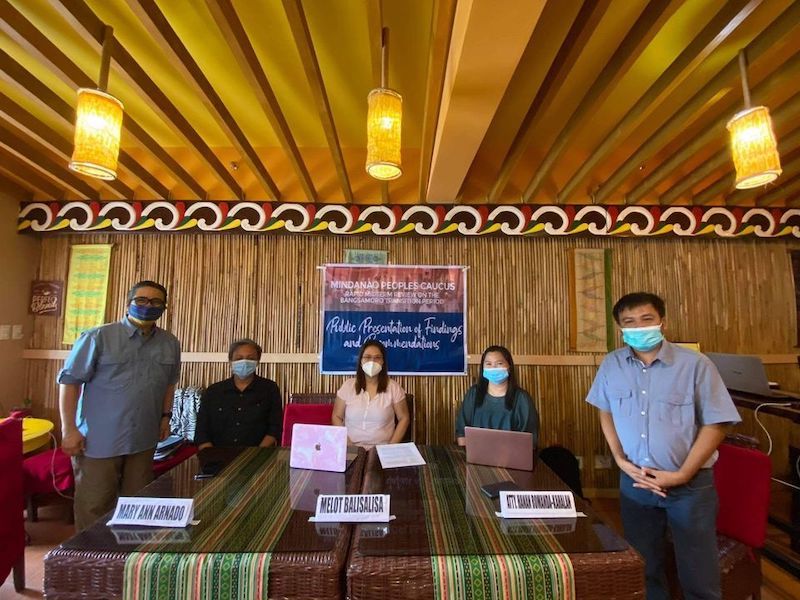
Presentation of the results of the mid-term review of the transition in the Bangsamoro at the Coffee for Peace on 07 October 2020. Photo courtesy of MPC
In their public presentation of findings and recommendations held at the Coffee for Peace on Tuesday, Arnado said that as of October 7, there were only 643 days left until June 30, 2022, the end of the transition period and supposedly the beginning of the term of the first set of elected BARMM officials. At present, the 80 members of the MILF-led BTA, the body governing the BARMM during the transition, are appointed by the President.
Arnado said no transition funds were released in 2019 as the BARMM inherited the 2019 budget of the Autonomous Region in Muslim Mindanao (ARMM). The BARMM, she said, ended up implementing projects of the ARMM that were already budgeted and contracted for under the 2019 General Appropriations Act.
The ARMM was abolished upon the ratification of the Bangsamoro law.
Arnado also reported that the 2019 and 2020 Social Development Fund of 5 billion pesos a year, had not been released as of the review period, and transition work in 2020 suffered delays both on the part of the BTA and the national government as the region and the rest of the country grappled with the COVID-19 pandemic.
She also cited the “circuitous” and installment release of the block grant, even as the law provides for a direct and comprehensive release.
2 phases
Arnado cited two stages of the transition: from the now defunct ARMM to the BARMM through the BTA — the appointed transition government — and from BTA to the elected Bangsamoro Government.
“In practical terms, transfer is completed,” Arnado said, referring to the first phase, but noted that it was not in accordance with the Bangsamoro law. She said the turnover was between the ARMM and the BARMM, “without the participation of the national government.”
“The turnover was actually deficient as it lacked participation of the inter-agency committee,” Arnado said, adding the law provides for the committee to ensure the liabilities of the ARMM are assumed by the national government, “to give the BARMM a clean slate.”
In their public presentation of findings and recommendations held at the Coffee for Peace on Tuesday, Arnado said that as of October 7, there were only 643 days left until June 30, 2022, the end of the transition period and supposedly the beginning of the term of the first set of elected BARMM officials. At present, the 80 members of the MILF-led BTA, the body governing the BARMM during the transition, are appointed by the President.
Arnado said no transition funds were released in 2019 as the BARMM inherited the 2019 budget of the Autonomous Region in Muslim Mindanao (ARMM). The BARMM, she said, ended up implementing projects of the ARMM that were already budgeted and contracted for under the 2019 General Appropriations Act.
The ARMM was abolished upon the ratification of the Bangsamoro law.
Arnado also reported that the 2019 and 2020 Social Development Fund of 5 billion pesos a year, had not been released as of the review period, and transition work in 2020 suffered delays both on the part of the BTA and the national government as the region and the rest of the country grappled with the COVID-19 pandemic.
She also cited the “circuitous” and installment release of the block grant, even as the law provides for a direct and comprehensive release.
2 phases
Arnado cited two stages of the transition: from the now defunct ARMM to the BARMM through the BTA — the appointed transition government — and from BTA to the elected Bangsamoro Government.
“In practical terms, transfer is completed,” Arnado said, referring to the first phase, but noted that it was not in accordance with the Bangsamoro law. She said the turnover was between the ARMM and the BARMM, “without the participation of the national government.”
“The turnover was actually deficient as it lacked participation of the inter-agency committee,” Arnado said, adding the law provides for the committee to ensure the liabilities of the ARMM are assumed by the national government, “to give the BARMM a clean slate.”
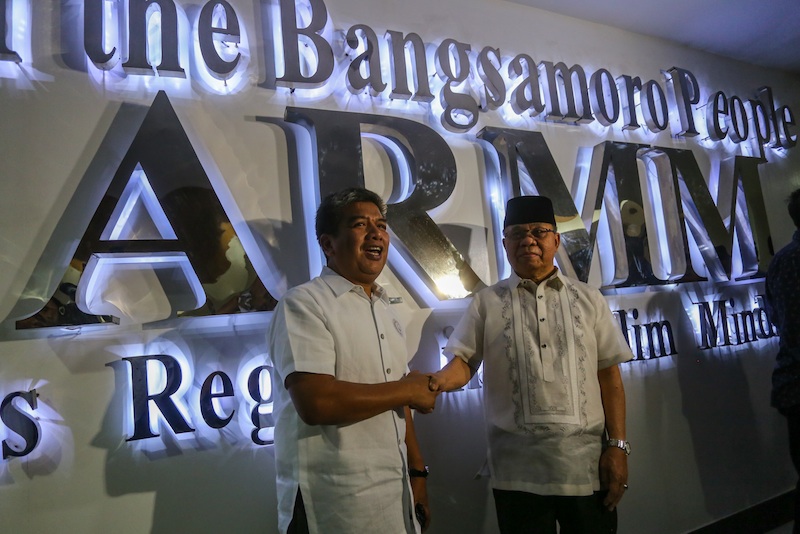
Mujiv Hataman, the last governor of the Autonomous Region in Muslim Mindanao (L) welcomes Interim Chief Minister Al Haj Murad Ebrahim of the Bangsamoro Transition Authority at the Office of the Bangsamoro People after the turnover rites at the Shariff Kabunsuan Cultural Center in Cotabato City on February 26, 2019. MindaNews photo by MANMAN DEJETO
ARMM Governor Mujiv Hataman handed over volumes of documents to MILF chair and BARMM’s interim Chief Minister Ahod Balawag Ebrahim, more popularly known by his nom de guerre Al Haj Murad Ebrahim, in symbolic rites held at the Shariff Kabunsuan Cultural Complex on February 26, 2019. The inauguration of the BARMM, however, was on March 29, 2019, graced by President Rodrigo Duterte.
The second stage of the transition, she added, is “much more challenging and complex as it necessitates the establishment of a parliamentary form of government ”and both the Bangsamoro and the national government are embarking on an “unchartered political experimentation which is laden with more questions than answers.”
The Bangsamoro law mandates the BTA to pass five priority codes: Administrative, Revenue, Electoral, Local Government, and Educational Code.
It also tasks the BTA to pass a Civil Service Code and the Indigenous Peoples Code; determine the parliamentary districts for the first regular election for Members of Parliament in May 2022; organize the bureaucracy, including the approval and implementation of a transition plan, and the institution of a placement process for hiring of personnel during transition, setting up of office and other institutions necessary for the continued functioning of government and delivery of social services and those necessary for the smooth operations of the first elected Bangsamoro Government in 2022.
Inter-Governmental Relations
The law provides for a National Government-Bangsamoro Government Intergovernmental Relations Body or IGRB, “to coordinate and resolve issues on intergovernmental relations through regular consultation and continuing negotiation in a non-adversarial manner.”
The IGRB is tasked to “exhaust all means to resolve issues brought before it.” Unresolved issues are to be elevated to the President, through the Bangsamoro Chief Minister.
The IGRB is headed by Finance Secretary Carlos Dominguez for the government, and Mohagher Iqbal for the Bangsamoro. Iqbal is the MILF peace implementing panel chair and concurrent Minister of Basic, Higher and Technical Education.
The Office of the Presidential Adviser on the Peace Process serves as the Secretariat.
As of September 30, the IGRB had met only thrice: on December 16, 2019; May 29, 2020; and August 28, 2020. (Its fourth meeting was held on Thursday, October 9).
ARMM Governor Mujiv Hataman handed over volumes of documents to MILF chair and BARMM’s interim Chief Minister Ahod Balawag Ebrahim, more popularly known by his nom de guerre Al Haj Murad Ebrahim, in symbolic rites held at the Shariff Kabunsuan Cultural Complex on February 26, 2019. The inauguration of the BARMM, however, was on March 29, 2019, graced by President Rodrigo Duterte.
The second stage of the transition, she added, is “much more challenging and complex as it necessitates the establishment of a parliamentary form of government ”and both the Bangsamoro and the national government are embarking on an “unchartered political experimentation which is laden with more questions than answers.”
The Bangsamoro law mandates the BTA to pass five priority codes: Administrative, Revenue, Electoral, Local Government, and Educational Code.
It also tasks the BTA to pass a Civil Service Code and the Indigenous Peoples Code; determine the parliamentary districts for the first regular election for Members of Parliament in May 2022; organize the bureaucracy, including the approval and implementation of a transition plan, and the institution of a placement process for hiring of personnel during transition, setting up of office and other institutions necessary for the continued functioning of government and delivery of social services and those necessary for the smooth operations of the first elected Bangsamoro Government in 2022.
Inter-Governmental Relations
The law provides for a National Government-Bangsamoro Government Intergovernmental Relations Body or IGRB, “to coordinate and resolve issues on intergovernmental relations through regular consultation and continuing negotiation in a non-adversarial manner.”
The IGRB is tasked to “exhaust all means to resolve issues brought before it.” Unresolved issues are to be elevated to the President, through the Bangsamoro Chief Minister.
The IGRB is headed by Finance Secretary Carlos Dominguez for the government, and Mohagher Iqbal for the Bangsamoro. Iqbal is the MILF peace implementing panel chair and concurrent Minister of Basic, Higher and Technical Education.
The Office of the Presidential Adviser on the Peace Process serves as the Secretariat.
As of September 30, the IGRB had met only thrice: on December 16, 2019; May 29, 2020; and August 28, 2020. (Its fourth meeting was held on Thursday, October 9).
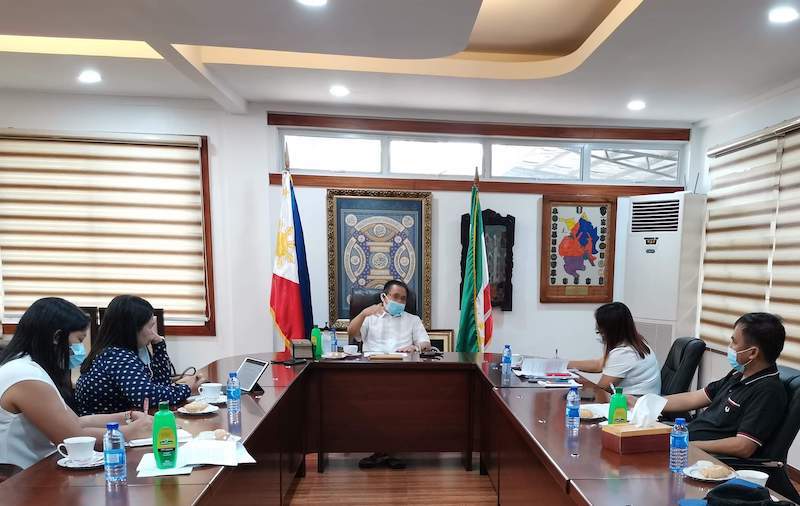
Mid-term review team interviews Bangsamoro Chief Minister Ahod Balawag Ebrahim. Photo courtesy of MPC
As of September 30, the IGR bodies that have been constituted are the Intergovernmental Fiscal Policy Board which had its first meeting on May 29, 2020 via video conference and the Terms of Reference (TOR) signed; Intergovernmental Infrastructure Development Board scheduled to be convened in October 2020 by the Department of Public Works and Highways and the Ministry of Public Works-BARMM; the Joint Body for the Zones of Joint Cooperation which held its first meeting on June 26, 2020 where the details of the TORs were discussed, and the Intergovernmental Energy Board whose task is to resolve all matters related to energy and other energy issues referred to it by the IGRB.
The other IGR bodies that have yet to be constituted are the Philippine Congress-Bangsamoro Parliament Forum for purposes of cooperation and coordination of legislative initiative, the Council of Leaders whose task is to “advise the Chief Minister on matters of governance in the Bangsamoro Autonomous Region,” and the Bangsamoro Sustainable Development Board.
The Council is to be headed by the Chief Minister and shall have as members, provincial governors and city mayors as well as members of Congress from the Bangsamoro region; representatives of traditional leaders, non-Moro indigenous communities, women, settler communities, the Ulama, youth, and Bangsamoro communities outside of the Bangsamoro region, and representatives of other sectors as may be determined by the Parliament.
The Bangsamoro Sustainable Development Board will be composed of representatives from the National Government and the Bangsamoro Government to “ensure the integration and harmonization of economic, social, and environmental considerations as vital dimensions of sustainable development policy and practice” in the Bangsamoro region.”
“Full transfer of powers and properties”
The BTA is also mandated to effect the “full transfer of powers and properties” of the defunct ARMM to the BARMM, except those properties, land, and structures located outside the region which shall be “purchased by the National Government at a price to be determined through the intergovernmental relations mechanism within one year from the ratification” of the law and proceeds from the purchase “shall be remitted to the Bangsamoro Government.”
As of September 30, the IGR bodies that have been constituted are the Intergovernmental Fiscal Policy Board which had its first meeting on May 29, 2020 via video conference and the Terms of Reference (TOR) signed; Intergovernmental Infrastructure Development Board scheduled to be convened in October 2020 by the Department of Public Works and Highways and the Ministry of Public Works-BARMM; the Joint Body for the Zones of Joint Cooperation which held its first meeting on June 26, 2020 where the details of the TORs were discussed, and the Intergovernmental Energy Board whose task is to resolve all matters related to energy and other energy issues referred to it by the IGRB.
The other IGR bodies that have yet to be constituted are the Philippine Congress-Bangsamoro Parliament Forum for purposes of cooperation and coordination of legislative initiative, the Council of Leaders whose task is to “advise the Chief Minister on matters of governance in the Bangsamoro Autonomous Region,” and the Bangsamoro Sustainable Development Board.
The Council is to be headed by the Chief Minister and shall have as members, provincial governors and city mayors as well as members of Congress from the Bangsamoro region; representatives of traditional leaders, non-Moro indigenous communities, women, settler communities, the Ulama, youth, and Bangsamoro communities outside of the Bangsamoro region, and representatives of other sectors as may be determined by the Parliament.
The Bangsamoro Sustainable Development Board will be composed of representatives from the National Government and the Bangsamoro Government to “ensure the integration and harmonization of economic, social, and environmental considerations as vital dimensions of sustainable development policy and practice” in the Bangsamoro region.”
“Full transfer of powers and properties”
The BTA is also mandated to effect the “full transfer of powers and properties” of the defunct ARMM to the BARMM, except those properties, land, and structures located outside the region which shall be “purchased by the National Government at a price to be determined through the intergovernmental relations mechanism within one year from the ratification” of the law and proceeds from the purchase “shall be remitted to the Bangsamoro Government.”
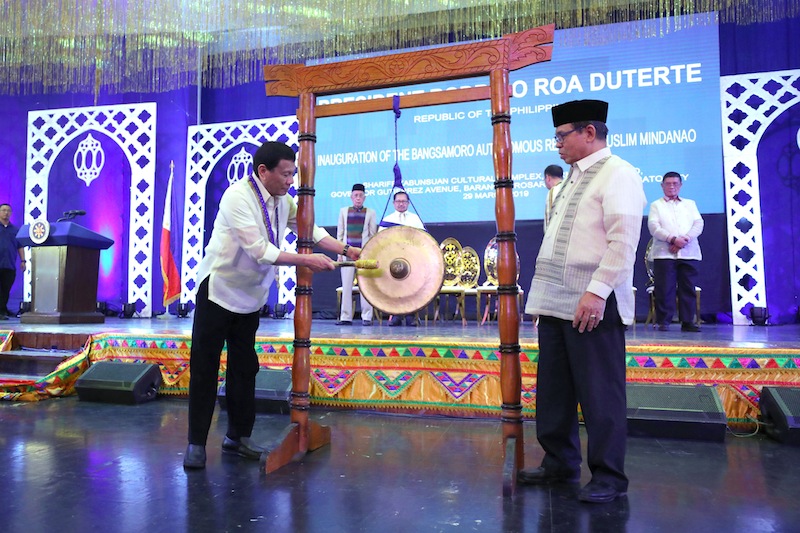
President Rodrigo Roa Duterte sounds the agong to signal the inauguration of the Bangsamoro Autonomous Region in Muslim Mindanao (BARMM) at the Shariff Kabunsuan Cultural Complex in Cotabato City on March 29, 2019. Joining the President is BARMM Interim Chief Minister Al Haj Murad Ebrahim. ROBINSON NIÑAL JR./PRESIDENTIAL PHOTO
“One year from ratification” would have been January 25, 2020 but the national government has yet to purchase the ARMM properties outside the region.
But it is not only the purchase of the ARMM properties that has not been accomplished by the national government.
The transfer and/or turnover of national government agencies, offices and government-owned and controlled corporations to various areas in the BARMM have yet to be implemented. Under the Bangsamoro law, these are supposed to be transferred “within three months from the organization” of the BTA or June 29, 2019 if reckoned from the March 29, 2019 inauguration.
The review listed these offices awaiting transfer and/or turnover: Departments of Agriculture, Agrarian Reform, Education, Interior and Local Government, Public Works and Highways, Science and Technology, Trade and Industry, Tourism, Transportation, and the Land Transportation and Franchising Board, Land Transportation Office, Philippine Ports Authority, Maritime Industry Authority and Civil Aviation Authority of the Philippines.
Cotabato City
Also to be turned over is Cotabato City which voted ‘yes’ to inclusion in the BARMM. The Ministry of Interior and Local Government is still awaiting transfer of the office of the Department of Interior and Local Government in the city to the BARMM.
Cotabato City Mayor Cynthia Guiani-Sayadi, who campaigned against the city’s inclusion in the BARMM, appealed to President Duterte in February this year to hold in abeyance its turnover to the BARMM until June 30, 2022 when the three-year transition period “has been completed and the BARMM bureaucracy would have been fully operational.”
Duterte asked both the city government and the BARMM for position papers but everyone’s attention soon shifted to the COVID-19 pandemic.
But Mayor Sayadi in a Facebook post in February quoted Local Governments Secretary Eduardo Ano as saying “i-defer muna pag-transfer sa December 2020.” Iqbal says they have yet to receive a copy of the President’s decision, if at all a decision had been made.
Arnado said the Department of Environment and Natural Resources has yet to transfer to the Ministry of Environment, Natural Resource and Energy, the management and protection of nature reserves and aquatic parks, forests, watershed reservations and other protected areas in the territorial jurisdiction of the BARMM;
“One year from ratification” would have been January 25, 2020 but the national government has yet to purchase the ARMM properties outside the region.
But it is not only the purchase of the ARMM properties that has not been accomplished by the national government.
The transfer and/or turnover of national government agencies, offices and government-owned and controlled corporations to various areas in the BARMM have yet to be implemented. Under the Bangsamoro law, these are supposed to be transferred “within three months from the organization” of the BTA or June 29, 2019 if reckoned from the March 29, 2019 inauguration.
The review listed these offices awaiting transfer and/or turnover: Departments of Agriculture, Agrarian Reform, Education, Interior and Local Government, Public Works and Highways, Science and Technology, Trade and Industry, Tourism, Transportation, and the Land Transportation and Franchising Board, Land Transportation Office, Philippine Ports Authority, Maritime Industry Authority and Civil Aviation Authority of the Philippines.
Cotabato City
Also to be turned over is Cotabato City which voted ‘yes’ to inclusion in the BARMM. The Ministry of Interior and Local Government is still awaiting transfer of the office of the Department of Interior and Local Government in the city to the BARMM.
Cotabato City Mayor Cynthia Guiani-Sayadi, who campaigned against the city’s inclusion in the BARMM, appealed to President Duterte in February this year to hold in abeyance its turnover to the BARMM until June 30, 2022 when the three-year transition period “has been completed and the BARMM bureaucracy would have been fully operational.”
Duterte asked both the city government and the BARMM for position papers but everyone’s attention soon shifted to the COVID-19 pandemic.
But Mayor Sayadi in a Facebook post in February quoted Local Governments Secretary Eduardo Ano as saying “i-defer muna pag-transfer sa December 2020.” Iqbal says they have yet to receive a copy of the President’s decision, if at all a decision had been made.
Arnado said the Department of Environment and Natural Resources has yet to transfer to the Ministry of Environment, Natural Resource and Energy, the management and protection of nature reserves and aquatic parks, forests, watershed reservations and other protected areas in the territorial jurisdiction of the BARMM;
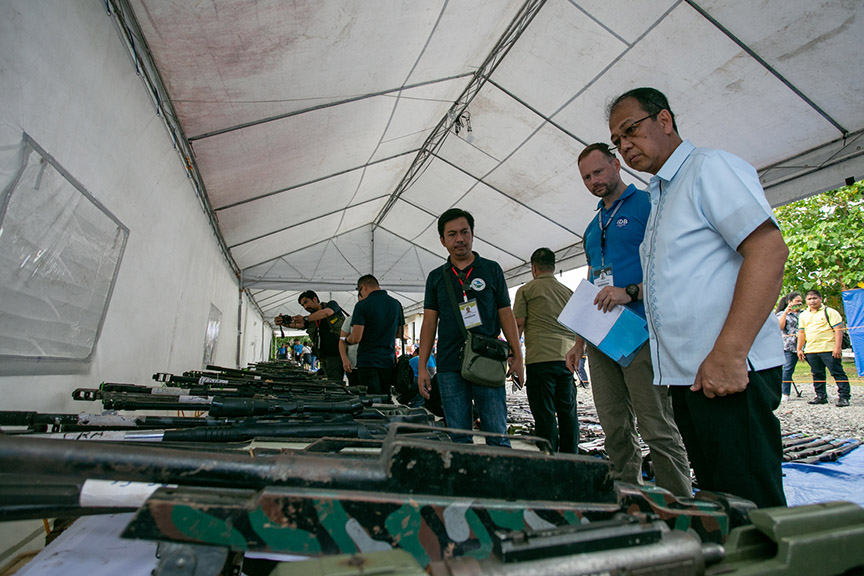
Secretary Carlito Galvez Jr. (right), Philippine Presidential Adviser on Peace, Reconcialiation and Unity inspects weapons from the Moro Islamic Liberation Front (MILF) that were decommissioned during the launch of the second phase of the decommissioning process of MILF weapons and combatants in Simuay, Sultan Kudarat on 7 September 2019. MindaNews photo by MANMAN DEJETO
On the normalization track, several issues have yet to be attended to, Arnado said, including the benefit package (housing, socio-economic livelihood, scholarship, Philhealth) for the 12,000 decommissioned combatants has yet to be completed.
The public presentation last Tuesday focused only on the legal and political track of the transition. A separate presentation, she said, will be made on the normalization track.
Arnado said they will also present their findings and recommendations to the BTA.
Ongoing
Lawyer Hanan Romanda Kahalan, a member of the review team, said the five priority codes (Administrative, Revenue, Election, Local Governments and Education) are in various stages of legislation.
Due to the COVID-19 lockdowns and border restrictions, sessions of the BTA Parliament which is tasked to pass these codes, were suspended in March, April and May.
On the normalization track, several issues have yet to be attended to, Arnado said, including the benefit package (housing, socio-economic livelihood, scholarship, Philhealth) for the 12,000 decommissioned combatants has yet to be completed.
The public presentation last Tuesday focused only on the legal and political track of the transition. A separate presentation, she said, will be made on the normalization track.
Arnado said they will also present their findings and recommendations to the BTA.
Ongoing
Lawyer Hanan Romanda Kahalan, a member of the review team, said the five priority codes (Administrative, Revenue, Election, Local Governments and Education) are in various stages of legislation.
Due to the COVID-19 lockdowns and border restrictions, sessions of the BTA Parliament which is tasked to pass these codes, were suspended in March, April and May.
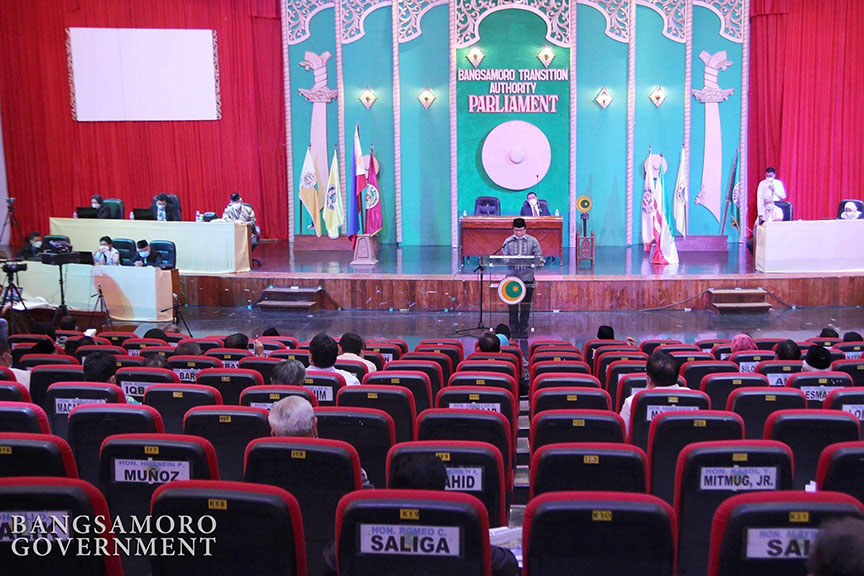
The Bangsamoro Parliament in session under the “new normal” at the Shariff Kabunsuan Cultural Complex. Photo courtesy of the Bangsamoro Government
Kahalan said the BTA Parliament has filed the proposed Administrative Code, Local Governance Code and Civil Service Code. The proposed Education Code has been approved by the Cabinet and it is ready for filing while the proposed Electoral Code is expected to be filed before the year ends.
The filing of certificates of candidacies in the synchronized national, regional (BARMM) and local elections of May 9, 2022 is in October 2021.
Arnado said the Revenue Code is still at the Technical Working Group (TWG) level as the drafting process awaits decisions from the Intergovernmental Fiscal Policy Board (IFBP) as issues on taxable elements within the Bangsamoro jurisdiction, among others, need to be determined and agreed upon.
Within six months from the establishment of the BTA, the IFPB is supposed to “determine the participation of the Bangsamoro Government in the Al-Amanah Islamic Investment Bank of the Philippines and the Southern Philippine Development Authority. This has not been done, Arnado said.
Kahalan said the BTA’s other accomplishments include the drafting and approval of the Parliamentary Rules and Procedures, the establishment of the Parliament, enactment of the Bangsamoro Appropriations Act, gradual phaseout of the ARMM personnel and organizing the BARMM bureaucracy, submission of Transition Plan and its approval by the BTA Parliament, placement process for hiring of personnel during transition and the launching of the Bangsamoro Job Portal.
It also released the internal revenue allotment (IRA) of 11 towns created during the administration of then ARMM Governor Zaldy Ampatuan, but which had no IRA until it was provided for in the Bangsamoro law.
The 63 barangays in North Cotabato that voted for inclusion in the BARMM are now under its supervision.
COVID-19 response
Also listed as accomplishments is the quick response of the BARMM in addressing the COVID-19 pandemic, a move commended by Presidential Peace Adviser Carlito Galvez, Jr., now Chief Implementer of the National Action Plan against COVID-19; allocation of 1.9 billion pesos for augmentation of medical equipment and supplies, hazard pay for health workers, medical assistance for COVID 19 patients through Ayudang Medical Mula sa Bangsamoro Government (AMBAG), and financial assistance for infected frontline workers; distribution of food packs and relief goods.
Kahalan said the BTA Parliament has filed the proposed Administrative Code, Local Governance Code and Civil Service Code. The proposed Education Code has been approved by the Cabinet and it is ready for filing while the proposed Electoral Code is expected to be filed before the year ends.
The filing of certificates of candidacies in the synchronized national, regional (BARMM) and local elections of May 9, 2022 is in October 2021.
Arnado said the Revenue Code is still at the Technical Working Group (TWG) level as the drafting process awaits decisions from the Intergovernmental Fiscal Policy Board (IFBP) as issues on taxable elements within the Bangsamoro jurisdiction, among others, need to be determined and agreed upon.
Within six months from the establishment of the BTA, the IFPB is supposed to “determine the participation of the Bangsamoro Government in the Al-Amanah Islamic Investment Bank of the Philippines and the Southern Philippine Development Authority. This has not been done, Arnado said.
Kahalan said the BTA’s other accomplishments include the drafting and approval of the Parliamentary Rules and Procedures, the establishment of the Parliament, enactment of the Bangsamoro Appropriations Act, gradual phaseout of the ARMM personnel and organizing the BARMM bureaucracy, submission of Transition Plan and its approval by the BTA Parliament, placement process for hiring of personnel during transition and the launching of the Bangsamoro Job Portal.
It also released the internal revenue allotment (IRA) of 11 towns created during the administration of then ARMM Governor Zaldy Ampatuan, but which had no IRA until it was provided for in the Bangsamoro law.
The 63 barangays in North Cotabato that voted for inclusion in the BARMM are now under its supervision.
COVID-19 response
Also listed as accomplishments is the quick response of the BARMM in addressing the COVID-19 pandemic, a move commended by Presidential Peace Adviser Carlito Galvez, Jr., now Chief Implementer of the National Action Plan against COVID-19; allocation of 1.9 billion pesos for augmentation of medical equipment and supplies, hazard pay for health workers, medical assistance for COVID 19 patients through Ayudang Medical Mula sa Bangsamoro Government (AMBAG), and financial assistance for infected frontline workers; distribution of food packs and relief goods.
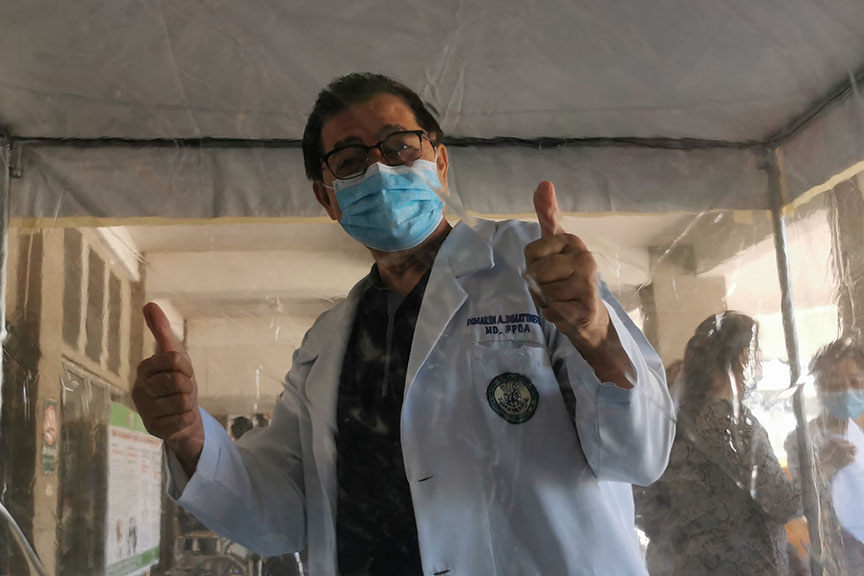
Dr. Dims Dimatingkal, chief of the professional medical staff of the Cotabato Regional and Medical Center (CRMC) in Cotabato City, gives a thumbs up sign inside a misting tent to be used in disinfecting all medical staff and visitors of the hospital. The new misting tent was among several personal protective equipment (PPE) and medical supplies donated by the Bangsamoro Region to augment the dwindling supplies of CRMC in the fight against COVID-19. MindaNews photo by FERDINANDH CABRERA
AMBAG, Kahalan said, also provides medical assistance to BARMM indigents and enhances the accessibility of health services, medicines, and medical procedures to its constituents.
The Office of the Chief Minister also allocated 155 million pesos to the local government units of the BARMM’s five provinces, three cities and 116 towns at 5 million pesos per province, 2 million pesos per city, 1 million per municipality and 8 million pesos for the 63 barangays in North Cotabato. The 2-M peso allocation for Cotabato City was not released as the city government did not submit the required documents.
Kahalan added that the BTA also built isolation centers for COVID-19 and distributed the Social Amelioration Program cash assistance to the region’s 506,954 beneficiaries. (Carolyn O. Arguillas / MindaNews)
AMBAG, Kahalan said, also provides medical assistance to BARMM indigents and enhances the accessibility of health services, medicines, and medical procedures to its constituents.
The Office of the Chief Minister also allocated 155 million pesos to the local government units of the BARMM’s five provinces, three cities and 116 towns at 5 million pesos per province, 2 million pesos per city, 1 million per municipality and 8 million pesos for the 63 barangays in North Cotabato. The 2-M peso allocation for Cotabato City was not released as the city government did not submit the required documents.
Kahalan added that the BTA also built isolation centers for COVID-19 and distributed the Social Amelioration Program cash assistance to the region’s 506,954 beneficiaries. (Carolyn O. Arguillas / MindaNews)
https://www.mindanews.com/peace-process/2020/10/mid-term-review-recommends-extension-of-bangsamoro-transition-until-june-2025/

No comments:
Post a Comment
Note: Only a member of this blog may post a comment.